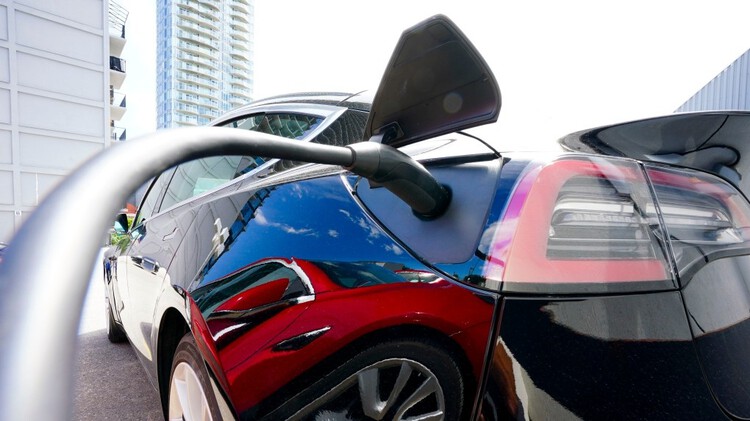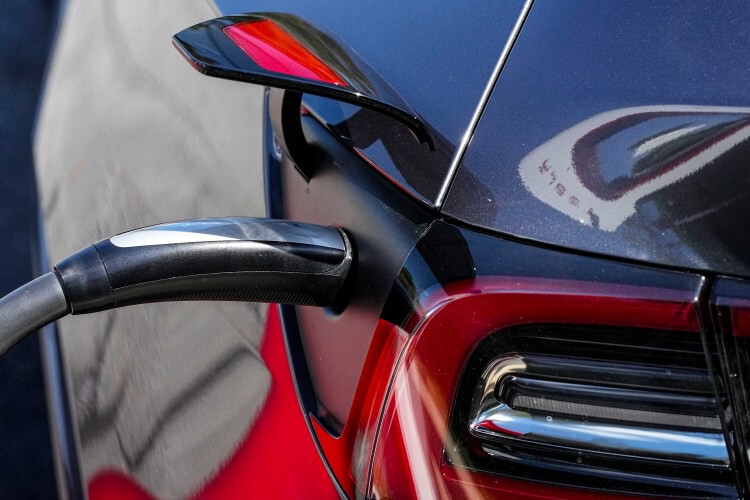Electric shock: A new study found that EVs were more expensive to fuel than gas-powered cars at the end of 2022
- Thread starter petros
- Start date
You are using an out of date browser. It may not display this or other websites correctly.
You should upgrade or use an alternative browser.
You should upgrade or use an alternative browser.
It's a valid point, although most rentals these days are actually in condo buildings. And condo owners are looking at this hard and many are already taking the plunge. Some are installing a few fast charges and charging, others are allowing owners to instal their own in their parking stalls with varous conditions. There are specialty electrical firms who just deal with this kind of thing and audit buildings for capacity and help them set up.I think the study might be skewed for one major reason. How many rent an apt unit compared to owning their home? That's going to be the big decider. I don't anticipate many landlords going through the expense of making sure their tenants all have access to chargers once the EV mandate comes into effect, especially in already existing buildings. And if they do, well I can see people's rents getting jacked up even if they don't drive.
But - one thing thats clear is that almost no building has capacity to provide for everyone. At least not with any speed.
So ... who's going to pay for THAT infrastructure. Thats a lot of money. That's a lot of money in the building and TO the building.
But you're right - the demographic is going to be a factor. And renters won't want to pay for the power grid upgrades needed to provide for an all-ev world.
LOL - I THOUGH 'man that can't be rightI know my operating costs to the penny. Id like to see similar from EVs that use commercial chargers.
The fuel cost is BS. I never set it. It was $1.46L
well what are the local commercial charges charging you? I'll work it out for you. It's not terribly hard math.Trip was Saskatoon to Regina light wind, -6° light wind, wet road surface, regular grade winter gas on snow tires and 2 passengers.
Money is no object when you're Prince Groper pretending to save the world from Canada's horrible, awful, worse than China's emissions.It's a valid point, although most rentals these days are actually in condo buildings. And condo owners are looking at this hard and many are already taking the plunge. Some are installing a few fast charges and charging, others are allowing owners to instal their own in their parking stalls with varous conditions. There are specialty electrical firms who just deal with this kind of thing and audit buildings for capacity and help them set up.
But - one thing thats clear is that almost no building has capacity to provide for everyone. At least not with any speed.
So ... who's going to pay for THAT infrastructure. Thats a lot of money. That's a lot of money in the building and TO the building.
But you're right - the demographic is going to be a factor. And renters won't want to pay for the power grid upgrades needed to provide for an all-ev world.
LOL - well of course it's no object, the budget balances itself yaknowMoney is no object when you're Prince Groper pretending to save the world from Canada's horrible, awful, worse than China's emissions.
Of course. Technically, the term is "bankruptcy."LOL - well of course it's no object, the budget balances itself yaknow
Does buying an electric vehicle make financial sense? — CTV News
While there are many benefits to electric cars, the question of whether they are a good financial choice in Canada is still up in the air, personal finance contributor Christopher Liew explains on CTVNews.ca.
Poor cold weather performance. EVs are powered by lithium batteries, which can often be fickle in Canada’s extreme winters. Battery life, range, and power distribution may not always be consistent.
Since EVs are relatively new, there’s no conclusive data on how long they last. However, most estimates claim that EV batteries should be able to last between eight and 15 years, depending on their usage. Canada’s extreme climate will likely contribute to batteries dying quicker.
EV’s have advantages too. This coming from a guy driving a truck made in 1992, so 33 years ago, & drives it as a daily driver.
Hydrogen ICE and fuel cell electric.
Hydrogen concerted with ammonia makes it possible to tank up on stable Hydrogen.
Emissions are water and nitrogen.

Hydrogen concerted with ammonia makes it possible to tank up on stable Hydrogen.
Emissions are water and nitrogen.
New technique seamlessly converts ammonia to green hydrogen
Researchers have developed a highly effective, environmentally friendly method for converting ammonia into hydrogen. The new technique is a major step forward for enabling a zero-pollution, hydrogen-fueled economy. The idea of using ammonia as a carrier for hydrogen delivery has gained traction...
www.sciencedaily.com
Are these batteries bi-polar? Is that why they need the lithium?
Does buying an electric vehicle make financial sense? — CTV News
While there are many benefits to electric cars, the question of whether they are a good financial choice in Canada is still up in the air, personal finance contributor Christopher Liew explains on CTVNews.ca.apple.news
Poor cold weather performance. EVs are powered by lithium batteries, which can often be fickle in Canada’s extreme winters. Battery life, range, and power distribution may not always be consistent.
Since EVs are relatively new, there’s no conclusive data on how long they last. However, most estimates claim that EV batteries should be able to last between eight and 15 years, depending on their usage. Canada’s extreme climate will likely contribute to batteries dying quicker.
EV’s have advantages too. This coming from a guy driving a truck made in 1992, so 33 years ago, & drives it as a daily driver.
TurdOWE hates nitrogen. At least if it helps grow crops.Hydrogen ICE and fuel cell electric.
Hydrogen concerted with ammonia makes it possible to tank up on stable Hydrogen.
Emissions are water and nitrogen.

New technique seamlessly converts ammonia to green hydrogen
Researchers have developed a highly effective, environmentally friendly method for converting ammonia into hydrogen. The new technique is a major step forward for enabling a zero-pollution, hydrogen-fueled economy. The idea of using ammonia as a carrier for hydrogen delivery has gained traction...www.sciencedaily.com
He hates ammonia and hydrogen from natural gas which is the logical choice.TurdOWE hates nitrogen. At least if it helps grow crops.
Of course. That how batteries work. Positive and negative poles.Are these batteries bi-polar? Is that why they need the lithium?

It's All A Big Scam 🤦🏾♂️
To Donate And Support The Channel Paypal: https://www.paypal.me/therealdocrichMerch: https://www.youtube.com/channel/UCMJD9wZVMP8X-9pa1JxbGTw/store Or http...
Canadian car dealers will have to sell a lot more electric vehicles under new regulations finalized on Tuesday.
Does it matter what their customers actually want to purchase? What if vehicle purchasers don’t want 20% of their vehicles to be EV’s or Hybrids by 2026? Then what?
Environment Minister Steven Guilbeault released the new rules at a press conference in Toronto. The rules also set targets for car makers, mandating that 20 per cent of their sales are electric or plug-in-hybrid vehicles vehicles by 2026, 60 per cent by 2030 and 100 per cent by 2035. The rules apply to light-duty vehicles like cars and SUVs, as well as some pick-up trucks.
Automakers who miss their targets will face financial penalties, but can avoid them by buying credits from other automakers. They can also receive credits for building electric vehicle chargers and can earn credits in advance of the new rules coming into place in 2026, etc….
Even with rebates currently in place, electric vehicles are more expensive than gas-powered vehicles. Guilbeault said he expects them to reach price parity with gas vehicles by the end of this decade or early in the 2030’s. He said even now when maintenance and fuel costs are factored in, there is a cost savings to electric vehicles.
(I’ve yet to have to replace a battery in my ‘92 Dakota that, factored in with labour and environmental fees, costs $60,000)
“The electricity you buy to power your electric vehicle is much cheaper than gasoline and not subject to the volatility of international oil prices and the maintenance cost of EVs are a fraction of internal combustion cars,” he said?

 apple.news
apple.news
At a press conference on Tuesday, Environment and Climate Change Minister Steven Guilbeault announced new standards that he says will provide more affordable EVs and more charging stations….paid for by whom?

 apple.news
apple.news
Does it matter what their customers actually want to purchase? What if vehicle purchasers don’t want 20% of their vehicles to be EV’s or Hybrids by 2026? Then what?
Environment Minister Steven Guilbeault released the new rules at a press conference in Toronto. The rules also set targets for car makers, mandating that 20 per cent of their sales are electric or plug-in-hybrid vehicles vehicles by 2026, 60 per cent by 2030 and 100 per cent by 2035. The rules apply to light-duty vehicles like cars and SUVs, as well as some pick-up trucks.
Automakers who miss their targets will face financial penalties, but can avoid them by buying credits from other automakers. They can also receive credits for building electric vehicle chargers and can earn credits in advance of the new rules coming into place in 2026, etc….
Even with rebates currently in place, electric vehicles are more expensive than gas-powered vehicles. Guilbeault said he expects them to reach price parity with gas vehicles by the end of this decade or early in the 2030’s. He said even now when maintenance and fuel costs are factored in, there is a cost savings to electric vehicles.
(I’ve yet to have to replace a battery in my ‘92 Dakota that, factored in with labour and environmental fees, costs $60,000)
“The electricity you buy to power your electric vehicle is much cheaper than gasoline and not subject to the volatility of international oil prices and the maintenance cost of EVs are a fraction of internal combustion cars,” he said?
Guilbeault's EV mandate will boost foreign imports over domestic: industry rep — National Post
Zero-emission vehicles must by 60 per cent of new sales by 2030, 100 per cent by 2035
At a press conference on Tuesday, Environment and Climate Change Minister Steven Guilbeault announced new standards that he says will provide more affordable EVs and more charging stations….paid for by whom?
Canada lays out road map for electric vehicle key 2035 targets — Global News
Ottawa is requiring carmakers to sell cars that emit no emissions by 2035. The government's strategy allows carmakers to earn and swap credits by selling electric vehicles.
$7 billion per month in interest payments.LOL - well of course it's no object, the budget balances itself yaknow
The CTV article confirmed a suspicion I had.Canadian car dealers will have to sell a lot more electric vehicles under new regulations finalized on Tuesday.
Does it matter what their customers actually want to purchase? What if vehicle purchasers don’t want 20% of their vehicles to be EV’s or Hybrids by 2026? Then what?
Environment Minister Steven Guilbeault released the new rules at a press conference in Toronto. The rules also set targets for car makers, mandating that 20 per cent of their sales are electric or plug-in-hybrid vehicles vehicles by 2026, 60 per cent by 2030 and 100 per cent by 2035. The rules apply to light-duty vehicles like cars and SUVs, as well as some pick-up trucks.
Automakers who miss their targets will face financial penalties, but can avoid them by buying credits from other automakers. They can also receive credits for building electric vehicle chargers and can earn credits in advance of the new rules coming into place in 2026, etc….
Even with rebates currently in place, electric vehicles are more expensive than gas-powered vehicles. Guilbeault said he expects them to reach price parity with gas vehicles by the end of this decade or early in the 2030’s. He said even now when maintenance and fuel costs are factored in, there is a cost savings to electric vehicles.
(I’ve yet to have to replace a battery in my ‘92 Dakota that, factored in with labour and environmental fees, costs $60,000)
“The electricity you buy to power your electric vehicle is much cheaper than gasoline and not subject to the volatility of international oil prices and the maintenance cost of EVs are a fraction of internal combustion cars,” he said?

Guilbeault's EV mandate will boost foreign imports over domestic: industry rep — National Post
Zero-emission vehicles must by 60 per cent of new sales by 2030, 100 per cent by 2035apple.news
At a press conference on Tuesday, Environment and Climate Change Minister Steven Guilbeault announced new standards that he says will provide more affordable EVs and more charging stations….paid for by whom?

Canada lays out road map for electric vehicle key 2035 targets — Global News
Ottawa is requiring carmakers to sell cars that emit no emissions by 2035. The government's strategy allows carmakers to earn and swap credits by selling electric vehicles.apple.news
They mentioned ordering and waiting lists to get your eMoskvich.
If the average EV is worth about $60,000, and has a lifespan of about five years (but let’s call it seven) optimistically, including the battery, does that mean my dodge Dakota so far has been worth 4.5 EV’s and counting? So about a quarter million dollar pick up truck so far…& if I get another couple years out of it… have covered the lifespan of five EV’s & counting?
What is an electric vehicle with a dead battery worth?
My old truck is worth no more or less than the day. I bought it at this point.
What is an electric vehicle with a dead battery worth?
My old truck is worth no more or less than the day. I bought it at this point.
Going into “troubling financial times” without using the “R” word… the minister of environment and climate change, wants to get a jump on bringing in these regulations so that it’s easier for people to get more EV’s by the deadline of 2035?The CTV article confirmed a suspicion I had.
They mentioned ordering and waiting lists to get your eMoskvich.
Do these people even hear themselves?
